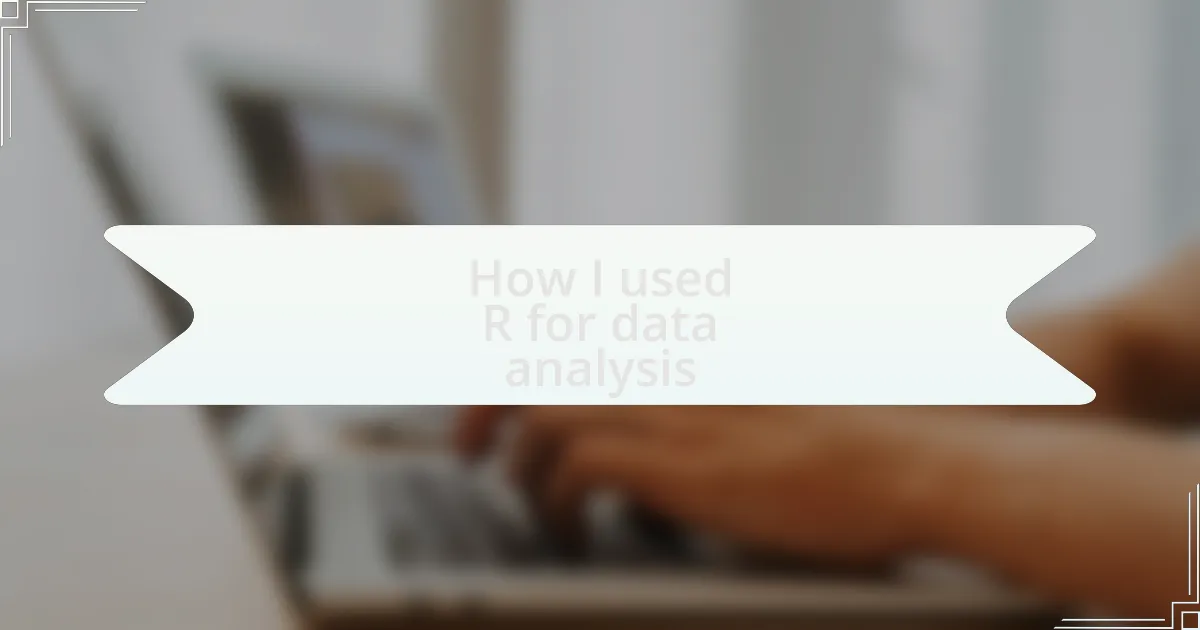Key takeaways:
- R programming offers extensive libraries and community support, enhancing data analysis and visualization capabilities.
- Data analysis transforms raw data into actionable insights, improving decision-making and fostering innovation in organizations.
- Personal projects using R can reveal hidden trends, with effective visualizations enhancing the storytelling aspect of data analysis.
- Challenges in data analysis, such as missing data, can lead to valuable learning experiences and skill development.
Author: Oliver Bennett
Bio: Oliver Bennett is an acclaimed author known for his gripping thrillers and thought-provoking literary fiction. With a background in journalism, he weaves intricate plots that delve into the complexities of human nature and societal issues. His work has been featured in numerous literary publications, earning him a loyal readership and multiple awards. Oliver resides in Portland, Oregon, where he draws inspiration from the vibrant local culture and stunning landscapes. In addition to writing, he enjoys hiking, cooking, and exploring the art scene.
Introduction to R for analysis
R is a powerful tool that has transformed the way I approach data analysis. I vividly remember the first time I used R for a project; the sheer flexibility and depth of its statistical capabilities blew me away. It was like opening a treasure chest of analytical insight that I had never encountered before.
One key aspect I appreciate about R is its extensive libraries, which make complex analyses straightforward. For example, when I needed to create beautiful visualizations, packages like ggplot2 became my go-to solution. Have you ever struggled to get your data into a format that tells a story? R can streamline that process remarkably, turning raw numbers into compelling visuals that communicate insights at a glance.
Learning R also fostered a sense of community for me. I often turned to online forums and user groups, and it was inspiring to see so many people sharing their discoveries and troubleshooting challenges together. How often do we find ourselves in environments that encourage such collaboration? In R’s ecosystem, I not only improved my skills but also connected with others who share the passion for data analysis.
Importance of data analysis
Data analysis is essential because it transforms raw data into actionable insights. I recall a project where I had tons of customer feedback data scattered across different spreadsheets. By analyzing this data, I identified critical trends that directly informed our product strategy. Isn’t it fascinating how the right analysis can steer a business in the right direction?
Moreover, utilizing data analysis enhances decision-making. I’ve been part of teams that made hasty decisions based on gut feelings, and the outcomes weren’t always positive. However, when we embraced data-driven strategies, each decision was backed by evidence, significantly increasing our chances of success. Have you ever noticed how confident you feel when you have data supporting your choices?
Lastly, the importance of data analysis extends beyond business metrics; it fosters innovation. I’ve seen ideas that seemed risky become successful ventures simply because we were willing to dive into the data. It empowers organizations to experiment, learn, and evolve—all pivotal in today’s rapidly changing landscape. How often do we miss opportunities simply because we overlook the stories buried in our data?
Overview of R programming language
R is a powerful programming language designed specifically for statistical computing and data analysis. My first encounter with R was during a university project where I was tasked with analyzing survey data. I was instantly drawn to its flexibility and the vast array of packages available, like ggplot2 for visualizations. Have you experienced that moment when a tool feels perfectly suited for your task? That’s how R felt for me.
What I appreciate about R is its active community and wealth of resources. I remember being stuck on a complex data cleaning issue, feeling a bit overwhelmed. A quick search led me to forums and tutorials created by other R users who had faced similar challenges. This sense of community support made it easier for me to overcome obstacles and refine my skills. Isn’t it reassuring to know that help is just a few clicks away?
Additionally, R allows for seamless integration with other programming languages and tools, enhancing its usability. For instance, I often combine R with Python for various data science projects to leverage the strengths of both languages. This adaptability not only enriches my analysis but also keeps my workflow dynamic and interesting. Have you explored the idea of blending different languages in your projects? It’s an approach that has significantly broadened my analytical capabilities.
My personal data analysis project
While working on my personal data analysis project, I focused on a dataset from a local nonprofit organization that analyzed community engagement patterns. What struck me was how R allowed me to uncover hidden trends that mere observation could not reveal. It felt like opening a treasure chest filled with insights, and every code line I wrote was a key unlocking another piece of that puzzle.
One evening, as I was diving into the intricacies of the data, I vividly recall the thrill of creating a striking visualization with ggplot2. Watching the narrative of my findings unfold before my eyes was a powerful moment. Have you ever felt that rush when a visual perfectly encapsulates your analysis? It’s moments like these that remind me of why I love data analysis so much—it’s not just numbers; it’s about telling a story.
I also faced hurdles along the way, like dealing with missing data that threatened to derail my progress. It was frustrating, but rather than backing down, I embraced the challenge and explored R’s extensive packages for data imputation. Each solution I implemented not only strengthened my proficiency with R but also deepened my understanding of the data itself. How do you usually handle unexpected obstacles in your projects? For me, these challenges often lead to the most valuable lessons.

Leave a Reply